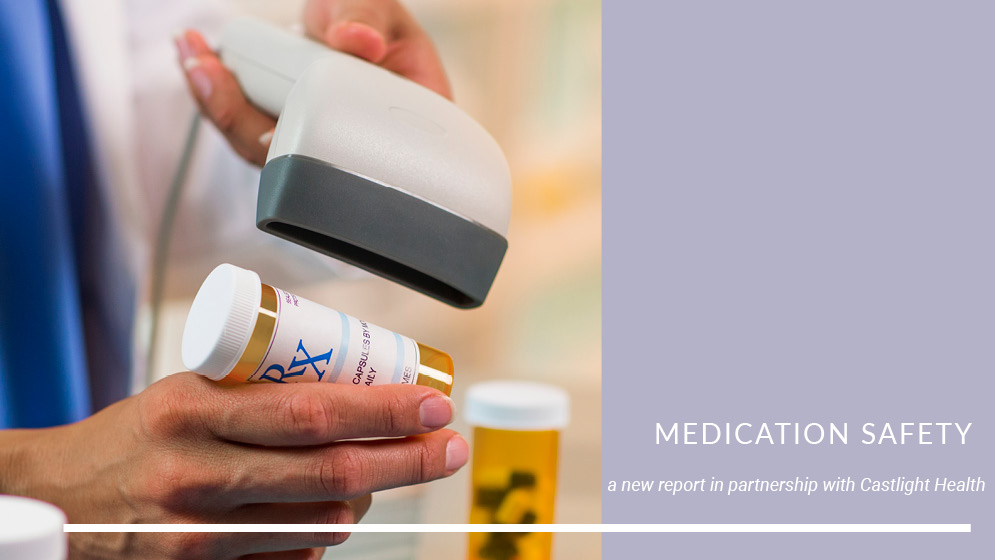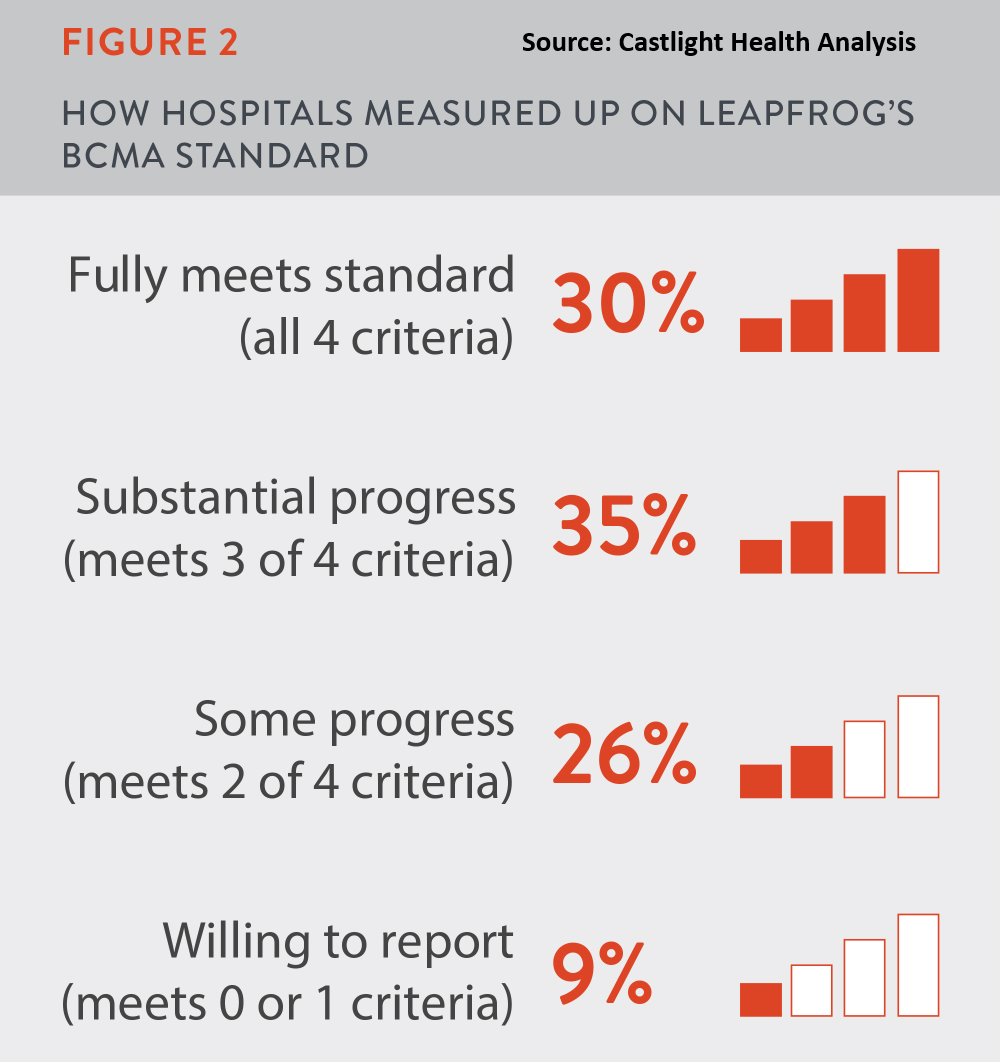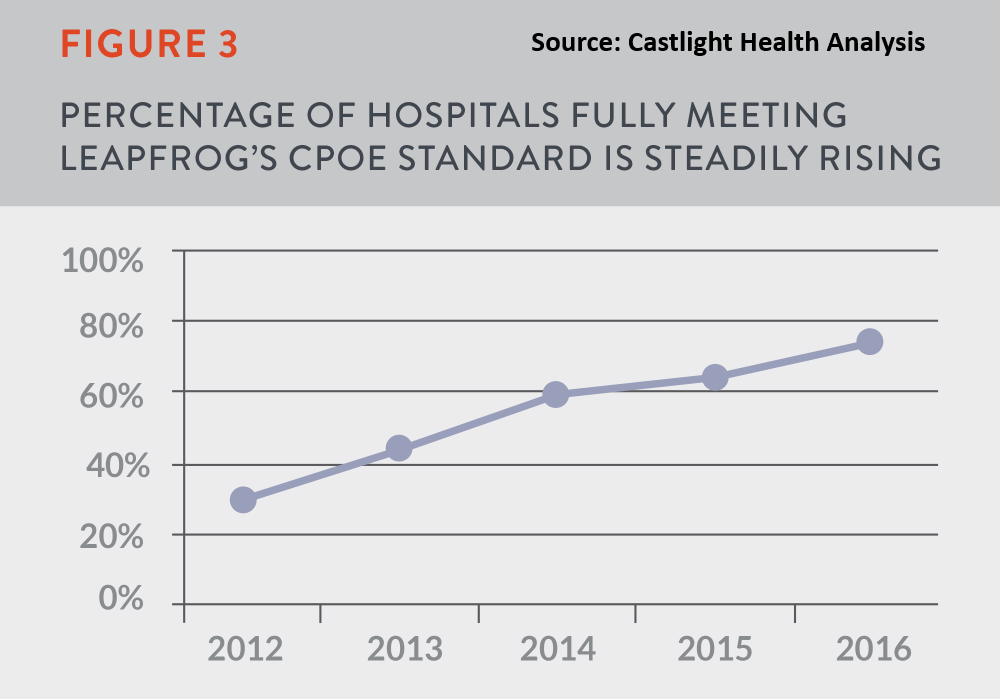
The Leapfrog Group, a national nonprofit watchdog committed to driving quality, safety, and transparency in the U.S. health care system, released its 2017 report on medication safety today. The report, analyzed by Castlight Health, included the first-ever public reporting of hospitals’ use of bar code medication administration (BCMA) to reduce medication errors, as well as reporting on the implementation and efficacy of hospitals’ computer physician order entry (CPOE) systems. Collectively, both technologies can be highly effective in reducing the incidence of medication errors, the most common error that occurs in hospitals. Disappointingly, fewer than one in four hospitals fully met both the BCMA and CPOE standards for medication safety, signaling a need for continued transparency and quality improvement.
BCMA systems scan a patient’s ID bracelet to intercept potential medication errors at the point of administration, including ensuring that the right patient is receiving the right medication. Leapfrog’s standard calls for hospitals to implement a BCMA system linked to an electronic medication administration record in 100 percent of the hospital’s medical/surgical and intensive care units, to scan both patient and medication barcodes 95 percent of the time and to have seven decision-support elements in place, as well as five best-practice processes and structures to prevent workarounds. The standard was developed by Leapfrog’s BCMA Expert Panel. While 2016 results showed that nearly all reporting hospitals (97.8 percent) have a BCMA system connected to their electronic medication administration record in at least one inpatient unit, only 30 percent fully met the standard.
 CPOE systems enable physicians to prescribe medication via an intelligence-backed system that checks patient information for known allergies, existing medications, and lab results to flag possible problems. Leapfrog’s standard calls for hospitals to order at least 75 percent of medications through a CPOE system and successfully complete Leapfrog’s CPOE Evaluation Tool, a one-of-a-kind simulation test that enables hospitals to test how well their CPOE systems are alerting them to potentially harmful and fatal errors. This year’s report shows significant improvement in CPOE with 74 percent of hospitals fully meeting the standard, more than double the percentage of hospitals that met the standard in 2012.
CPOE systems enable physicians to prescribe medication via an intelligence-backed system that checks patient information for known allergies, existing medications, and lab results to flag possible problems. Leapfrog’s standard calls for hospitals to order at least 75 percent of medications through a CPOE system and successfully complete Leapfrog’s CPOE Evaluation Tool, a one-of-a-kind simulation test that enables hospitals to test how well their CPOE systems are alerting them to potentially harmful and fatal errors. This year’s report shows significant improvement in CPOE with 74 percent of hospitals fully meeting the standard, more than double the percentage of hospitals that met the standard in 2012.
"Much more needs to be done to reduce the prevalence of medication errors"
“We’re excited to see this first-ever reporting of hospitals’ usage of BCMA to improve medication safety, but disheartened to learn so few hospitals are meeting the standard. We’re hopeful that over time hospital performance will improve as we’ve seen with CPOE, for which 74 percent of hospitals met the standard this year. Still, only a startling 22 percent of hospitals fully met the Leapfrog standards for both CPOE and BCMA,” said Leah Binder, president and CEO of Leapfrog. “This tells us that much more needs to be done to reduce the prevalence of medication errors, which harm millions of patients each year.”
“By shining a light on the needed improvements around medication safety, we’re helping to support the overall goal of providing both consumers and employers with the best information to make health care decisions,” said Maeve O’Meara, senior vice president of Product at Castlight Health. “It’s of crucial importance to both Castlight and Leapfrog that this information is made available by individual hospital.”
The complete Medication Safety Report is available online. Additional resources and tools for patients, employers and purchasers, may be found here.
